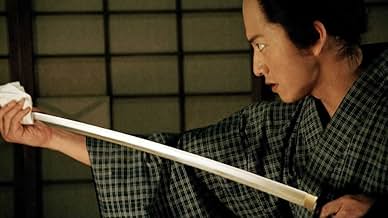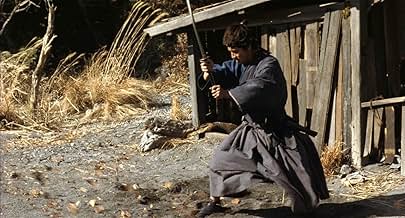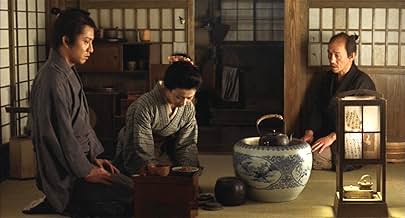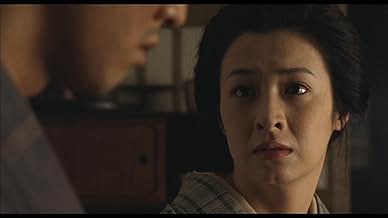CALIFICACIÓN DE IMDb
7.7/10
4.5 k
TU CALIFICACIÓN
Agrega una trama en tu idiomaA look at the relationship between a young blind samurai (Kimura) and his wife, who will make a sacrifice in order to defend her husband's honor.A look at the relationship between a young blind samurai (Kimura) and his wife, who will make a sacrifice in order to defend her husband's honor.A look at the relationship between a young blind samurai (Kimura) and his wife, who will make a sacrifice in order to defend her husband's honor.
- Dirección
- Guionistas
- Elenco
- Premios
- 15 premios ganados y 16 nominaciones en total
Z. Charles Bolton
- Man B
- (English version)
- (voz)
Duncan Brannan
- Hori
- (English version)
- (voz)
- …
Cole Brown
- Sensei
- (English version)
- (voz)
Chris Burnett
- Shinsuke
- (English version)
- (voz)
Colleen Clinkenbeard
- Kayo Mimura
- (English version)
- (voz)
Opiniones destacadas
Yoji Yamada's appropriately dubbed 'Love and Honor' is a samurai's story of just that; Takuya Kimura is Mimura, a samurai who is used to test food for poisoning by eating it in order to prevent the lord of his clan from being poisoned. Mimura becomes blind after being fed an off-season food that can become poisonous if not prepared properly. Unable to provide for himself, Mimura becomes suicidal. His loving wife Kayo declares her support for him, offering to follow him into death. Mimura is convinced to continue on living, but with Mimura unable to provide for he and his family, his wife is left to find a way to support them. In this classic tale of love and honor, follow a blind man's struggles to find peace of mind as he tries to follow his samurai code.
Both the setting of the theme and the creation of the emotional atmosphere tend to make the film more romantic. And exquisite detail guarantees the reliability that a drama about ancient Japan should have. Although the film mainly focuses on the daily life of a samurai, the director Yôji Yamada still gave a little bit of chivalric romance to the ending. However, there is no coexistence between the everyday life and the spirit of a samurai.
Therefore, the protagonist's choice finally writes a summary for this passing era.
Do we need to know everything? Would our lives be better if there were certain things we didn't know? These are matters addressed in this story of a samurai family and life in feudal Japan. It was the duty of certain lower level samurai to taste the food before serving it to the lord of the clan in case it might be poisoned. When Shinnojo Mimura, one of the food tasters, eats some tainted sashimi of an off-season shellfish, he falls ill. After a period of unconsciousness, he awakes to find that he is unable to see. At first, he tries to hide the fact from his deeply loyal wife, Kayo, for fear of worrying her. When she understands that, she protests that she is his wife and it is her duty to worry for her husband. However, when she learns from the doctor, who has withheld the truth from his patient, that this blindness is permanent, she also avoids telling her husband, in order to spare his feelings. There are certain truths that are better for us not to confront. Gossip, however, is another matter. What happens when Mimura learns his wife has been seen in the company of another man? Which is more important, love or honor? That is the dilemma Mimura is faced with in this poignant film. It is a fascinating look at life, duty and honor during the samurai era and well worth watching.
Others have commented on the story so I will skip the synopsis.
The story is about human drama, and the unusual talent the main character has that leads to bombastic climax. This is typical Shuhei Fujisawa's style, and this story is no exception.
What took away from the story compared to other Shuhei Fujisawa based movie is the poor acting by Takuya Kimura. His impatient and jittery personality shows in his acting, and the poor ways he speaks the dialog all takes away from the proper mood of the story. As the member of SMAP - a Japanese idol group, his acting DNA was bread for more modern situation, and probably isn't a good match for a period drama like this one. I couldn't get the feeling that this was a samurai living several hundred years ago. His poor dialog skill also was evident in more recent movie Uchuu Senkan Yamato as well. Another period piece starring his SMAP colleague Shingo Katori's "Zatoichi The Final" was also a flop, attesting to the mismatch of SMAP member with samurai movies.
So the main focus was weak, but the movie still has quality all its own. The sword fight scene was superb like other Fujisawa novel based movies. As a samurai movie, this is still one of the best in recent years, and is recommended along with other Shuhei Fujisawa movies such as Hisshiken Torizashi, and Hana no Ato.
The story is about human drama, and the unusual talent the main character has that leads to bombastic climax. This is typical Shuhei Fujisawa's style, and this story is no exception.
What took away from the story compared to other Shuhei Fujisawa based movie is the poor acting by Takuya Kimura. His impatient and jittery personality shows in his acting, and the poor ways he speaks the dialog all takes away from the proper mood of the story. As the member of SMAP - a Japanese idol group, his acting DNA was bread for more modern situation, and probably isn't a good match for a period drama like this one. I couldn't get the feeling that this was a samurai living several hundred years ago. His poor dialog skill also was evident in more recent movie Uchuu Senkan Yamato as well. Another period piece starring his SMAP colleague Shingo Katori's "Zatoichi The Final" was also a flop, attesting to the mismatch of SMAP member with samurai movies.
So the main focus was weak, but the movie still has quality all its own. The sword fight scene was superb like other Fujisawa novel based movies. As a samurai movie, this is still one of the best in recent years, and is recommended along with other Shuhei Fujisawa movies such as Hisshiken Torizashi, and Hana no Ato.
This is a really good film. Slow paced, just like real life in the Edo jidai. A good story, excellent acting and it gives good insight to the daily life of a low level samurai. There's a great atmosphere with not flashy but realistic scenery.
If you are looking for lots of action and swordplay, this isn't for you. But I found this film strangely moving and quite beautifully arranged.
Well worth seeing.
If you are looking for lots of action and swordplay, this isn't for you. But I found this film strangely moving and quite beautifully arranged.
Well worth seeing.
¿Sabías que…?
- TriviaIn the film it is mentioned repeatedly that the main character of Shinnojo Miura receives a yearly stipend of 30 koku. During the Edo period of Japan a koku was a unit of measure that had the equivalent of one year's worth of rice for a person (approx. 150 kg). For a samurai 30 koku was a small salary and Shinnojo was thus of a low level. Incidentally, the title character from another of Yôji Yamada's films El ocaso del samurái (2002) also receives a 30 koku stipend after having 20 koku deducted from his 50 koku salary to pay for his recently deceased wife's funeral.
- ErroresIt is not stated why, when blinded, he could not continue with his food tasting role, for which sight is not required.
- Citas
Shinnojo Mimura: Be resolved you will both die. In that lies victory. Life lies in resolve for death.
- ConexionesFollows El ocaso del samurái (2002)
Selecciones populares
Inicia sesión para calificar y agrega a la lista de videos para obtener recomendaciones personalizadas
- How long is Love and Honor?Con tecnología de Alexa
Detalles
- Fecha de lanzamiento
- País de origen
- Sitio oficial
- Idioma
- También se conoce como
- Love and Honor
- Locaciones de filmación
- Productoras
- Ver más créditos de la compañía en IMDbPro
Taquilla
- Total en EE. UU. y Canadá
- USD 60,910
- Fin de semana de estreno en EE. UU. y Canadá
- USD 5,234
- 4 may 2008
- Total a nivel mundial
- USD 33,755,574
- Tiempo de ejecución2 horas 2 minutos
- Color
- Mezcla de sonido
- Relación de aspecto
- 1.85 : 1
Contribuir a esta página
Sugiere una edición o agrega el contenido que falta

Principales brechas de datos
By what name was Bushi no ichibun (2006) officially released in India in English?
Responda

























